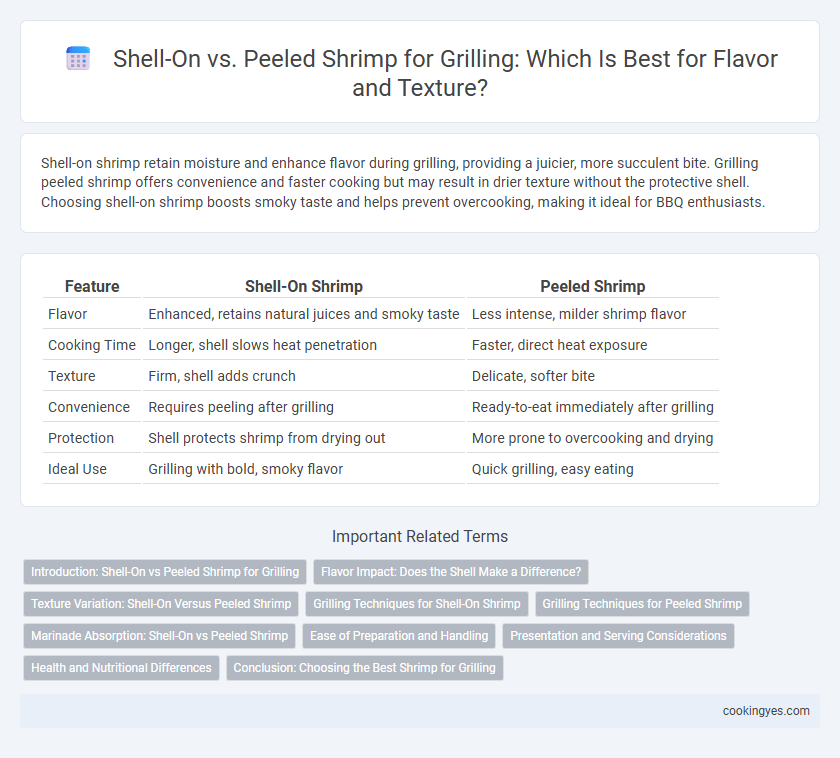Shell-on shrimp retain moisture and enhance flavor during grilling, providing a juicier, more succulent bite. Grilling peeled shrimp offers convenience and faster cooking but may result in drier texture without the protective shell. Choosing shell-on shrimp boosts smoky taste and helps prevent overcooking, making it ideal for BBQ enthusiasts.
Table of Comparison
| Feature | Shell-On Shrimp | Peeled Shrimp |
|---|---|---|
| Flavor | Enhanced, retains natural juices and smoky taste | Less intense, milder shrimp flavor |
| Cooking Time | Longer, shell slows heat penetration | Faster, direct heat exposure |
| Texture | Firm, shell adds crunch | Delicate, softer bite |
| Convenience | Requires peeling after grilling | Ready-to-eat immediately after grilling |
| Protection | Shell protects shrimp from drying out | More prone to overcooking and drying |
| Ideal Use | Grilling with bold, smoky flavor | Quick grilling, easy eating |
Introduction: Shell-On vs Peeled Shrimp for Grilling
Shell-on shrimp retain moisture and enhance flavor during grilling, providing a natural barrier that prevents overcooking and adds a satisfying crunch. Peeled shrimp cook faster and absorb marinades more intensely, offering convenience and quicker preparation for grilled dishes. Choosing between shell-on and peeled shrimp depends on desired texture, cooking time, and flavor intensity in your grilled recipes.
Flavor Impact: Does the Shell Make a Difference?
Grilling shrimp with the shell on enhances flavor by locking in natural juices and providing a smoky, charred aroma that seeps into the meat. The shell acts as a protective barrier, preventing overcooking and preserving tenderness while intensifying the taste with a subtle briny essence. Peeled shrimp cook faster but may lose moisture and flavor depth, making shell-on shrimp the preferred choice for grilling enthusiasts seeking robust, savory results.
Texture Variation: Shell-On Versus Peeled Shrimp
Shell-on shrimp retain their natural juices during grilling, resulting in a firmer, more succulent texture with a slight crispness from the caramelized shell. Peeled shrimp grill faster and offer a tender, more delicate bite but can dry out quickly without the protective shell. Choosing shell-on enhances flavor complexity and moisture, while peeled shrimp provide ease of seasoning and quicker cooking time.
Grilling Techniques for Shell-On Shrimp
Grilling shell-on shrimp enhances flavor retention and prevents moisture loss by protecting the tender meat from direct heat. The shells act as a natural barrier, allowing for even cooking and a slightly smoky char that elevates the shrimp's texture. To maximize results, preheat the grill to medium-high heat, oil the grates to avoid sticking, and cook shrimp for 2-3 minutes per side until opaque and firm.
Grilling Techniques for Peeled Shrimp
Grilling peeled shrimp requires careful attention to prevent overcooking and ensure even heat distribution, often achieved by using skewers or grilling baskets. Marinating peeled shrimp enhances flavor and helps retain moisture, while a high heat setting ensures a quick sear that locks in juiciness. Monitoring for a firm texture and opaque color signals perfectly grilled shrimp, avoiding dryness common with shell-on variants.
Marinade Absorption: Shell-On vs Peeled Shrimp
Shell-on shrimp retain their protective barrier, which limits marinade absorption and results in a more subtle flavor infusion during grilling. Peeled shrimp expose the flesh directly, allowing marinades to penetrate deeply for a stronger, more pronounced taste. Choosing peeled shrimp enhances flavor absorption but sacrifices the moisture retention benefits provided by the shell.
Ease of Preparation and Handling
Shell-on shrimp retain their protective exoskeleton, which simplifies handling by providing a natural grip and reducing the risk of overcooking during grilling. Peeled shrimp require less prep time since they don't need to be deveined or peeled before grilling, allowing for quicker seasoning and cooking. Choosing shell-on shrimp enhances ease of handling and flavor retention, while peeled shrimp offer convenience in preparation and faster grilling times.
Presentation and Serving Considerations
Shell-on shrimp retain a vibrant, natural appearance that enhances presentation and provides a rustic, authentic grilling experience. Peeled shrimp offer convenience for seamless serving and easy consumption, making them ideal for dishes requiring immediate use without the mess of shell removal. Choosing shell-on can elevate visual appeal and flavor retention, while peeled shrimp streamline plating and enhance guest accessibility.
Health and Nutritional Differences
Shell-on shrimp retain more nutrients during grilling due to the protective barrier of the shell, which helps preserve antioxidants and minerals like zinc and selenium. Peeled shrimp may lose some essential nutrients and moisture when exposed directly to high heat, potentially reducing their overall nutritional value. Opting for shell-on shrimp supports better nutrient retention and may enhance the health benefits of your grilled seafood.
Conclusion: Choosing the Best Shrimp for Grilling
Shell-on shrimp retain their natural juices and impart a richer flavor when grilled, making them ideal for a more intense taste experience. Peeled shrimp cook faster and allow for easy seasoning absorption but risk drying out without the protective shell. Selecting the best shrimp for grilling depends on whether flavor preservation or convenience is prioritized.
Shell-on vs peeled shrimp for grilling Infographic

 cookingyes.com
cookingyes.com